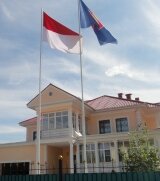Headline News
|
5.06.2013
Foster Gultom, Astana | Opinion | Sat, June 01 2013, 12:41 PM
Twenty years ago, precisely on June 2, 1993, Indonesia and Kazakhstan established diplomatic relations. This official amity between the two countries was a milestone of their close cooperation following Indonesia’s recognition of the proclamation of independence of the Republic of Kazakhstan, on Dec. 16, 1991. Indonesia and Kazakhstan have a lot in common. Both countries are blessed with an abundance of natural resources that allows them to earn significant amounts of revenue. The two countries have a moderate Muslim majority, a harmonious diversity of cultures and a commitment to human rights, rule of law and democracy. All this despite the big difference in population, as Kazakhstan’s population is only 7 percent of Indonesia’s population of 245 million people. Much has been done so far to take advantage of the opportunities that are available for the mutual benefit of the two countries. However, there is still plenty of work to do to further improve the positive results of the bilateral relations. During the first five years of the diplomatic relations, the heads of state of Indonesia and Kazakhstan exchanged visits. President Soeharto paid a state visit to Almaty in April 1995, which was reciprocated by a state visit from President Nursultan Nazarbayev to Jakarta just over three months later. Both visits had outcomes in the form of agreements on economic and technical cooperation, cooperation in banking arrangements, health cooperation and cooperation between the chambers of commerce and industry of both countries. Unfortunately, such agreements and commitments at state level and among the private sectors did not materialize due to the slow implementation process. The establishment of a bilateral intergovernmental commission as mandated by the Agreement on the Economic and Technical Cooperation, for example, is still pending. This may have happened as a result of Indonesia plunging into unprecedented economic turmoil and its ensuing multidimensional crisis in 1997-1998 as an impact of the Asian monetary crisis. It took almost two periods of IMF structural adjustment programs taking almost six years for Indonesia to recover its economy back to the pre-crisis condition. As a result, this delayed the international activities of the Indonesian government in terms of bilateral economic and social cooperation for quite some time. Later, the visit of then Indonesian foreign minister Hassan Wirajuda to Astana to meet his counterpart, Marat Tazhin, on May 14, 2008 marked another milestone for Indonesia-Kazakhstan bilateral relations. Soon after, the Indonesian government opened an embassy in Astana on Dec. 29, 2010, followed then by the opening of the Embassy of the Republic of Kazakhstan in Jakarta during the visit of President Nazarbayev to Jakarta on April 13, 2012. It is worth pointing out that since then, the two countries’ top government officials have increased the exchange of visits, either for the purpose of attending international conferences or bilateral meetings. This includes the visit of the Kazakhstan president to Jakarta on April 12-14, 2012, and the visit of the Indonesian vice president to Astana to attend the seventh World Islamic Economic Forum as well as the visit of Indonesian Foreign Minister Marty Natalegawa to Astana on June 28, 2011, to attend the 38th Session of the Council of Foreign Ministers of the Organization of Islamic Cooperation, which Kazakhstan hosted. President Nazarbayev’s trip to Jakarta in April 2012 was the most recent landmark of the bilateral relationship between the two countries. His bilateral meeting with President Susilo Bambang Yudhoyono on April 13 resulted in agreements inter alia, the establishment of visa free travel for diplomatic and service passport holders of both countries, which took effect on Jan. 26, 2013, and commitment to increasing bilateral trade volume by up to five times from the current volume. The two leaders also encouraged Indonesian and Kazakh companies to intensify collaboration, including the establishment of joint stock companies or joint ventures both in Kazakhstan and Indonesia in the agreed sector of business by both parties. It is obvious that the interaction and relationship between Indonesia and Kazakhstan has flourished in the last five years, after a quite long lapse. There is a significant positive trend in bilateral trade volume between Indonesia and Kazakhstan since 2008 until 2012 with an increase of 16.80 percent. While in 2012, the trade volume rose more than 90 percent from the 2011 mark. The spectrum of cooperation is also expanding into the parliament-to-parliament relations to add to the already well-established relations between governments and businesses of the two countries. Currently and for the future, it is equally important to encourage the people-to-people aspect of relationship. The upward trend of tourists traveling from Indonesia to Kazakhstan, and vice versa, shows the positive interest of the people from the two countries to get know each other. It will create mutual understanding and respect of their respective histories, culture and civilization as well as the exotic beauty and nature of the two countries. Kazakh students and academics have also participated in scholarship programs as well as arts and cultural short-term programs offered by the Indonesian government to enhance closer interactions among the grass roots. All of these inked by the two leaders and the follow up are now put to the government agencies, private sector and other stake holders of both nations to bear fruit for the benefit of the Kazakh and Indonesian people. In doing so, hopefully the dream will come true. The writer is Indonesian ambassador to Kazakhstan and Tajikistan. Source : Jakarta Post, 01 June 2013 |
|
|
Latest news






